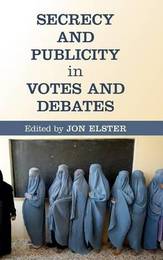
|
Secrecy and Publicity in Votes and Debates
Hardback
Main Details
| Title |
Secrecy and Publicity in Votes and Debates
|
| Authors and Contributors |
Edited by Jon Elster
|
| Physical Properties |
| Format:Hardback | | Pages:268 | | Dimensions(mm): Height 235,Width 160 |
|
| ISBN/Barcode |
9781107083363
|
| Classifications | Dewey:324 |
|---|
| Audience | | Professional & Vocational | |
|---|
| Illustrations |
18 Tables, unspecified; 8 Line drawings, black and white
|
|
Publishing Details |
| Publisher |
Cambridge University Press
|
| Imprint |
Cambridge University Press
|
| Publication Date |
26 June 2015 |
| Publication Country |
United Kingdom
|
Description
In the spirit of Jeremy Bentham's Political Tactics, this volume offers the first comprehensive discussion of the effects of secrecy and publicity on debates and votes in committees and assemblies. The contributors - sociologists, political scientists, historians, legal scholars - consider the micro-technology of voting (the devil is in the detail), the historical relations between the secret ballot and universal suffrage, the use and abolition of secret voting in parliamentary decisions, and the sometimes perverse effects of the drive for greater openness and transparency in public affairs. The authors also discuss the normative questions of secret versus public voting in national elections and of optimal mixes of secrecy and publicity, as well as the opportunities for strategic behavior created by different voting systems. Together with two previous volumes on Collective Wisdom (Cambridge University Press, 2012) and Majority Decisions (Cambridge University Press, 2014), the book sets a new standard for interdisciplinary work on collective decision-making.
Author Biography
Jon Elster is Robert K. Merton Professor of Social Science at Columbia University. He has also taught at the Universite de Paris V, the University of Oslo, the University of Chicago, and the College de France. He is author of twenty-three monographs, translated into eighteen languages, and editor or co-editor of twenty-one volumes. Elster has held positions in departments of philosophy, history, sociology, political science, and economics and has published articles in journals spanning across these fields, as well as in law journals. He is a member of five scientific academies, has received honorary doctorates from seven universities, and has delivered over two dozen named lectures, including the Tanner lectures.
Reviews'This is a volume that breaks new ground and is of great theoretical, historical, and empirical interest. The editor has managed to get together a fine group of experts, some of them quite prominent in the social sciences. In many chapters, the narratives are full of surprises, twists, and puzzles so as to make an interesting reading to general social science readers beyond specialists on electoral systems and their historical evolution. This collection is full of fresh and stimulating insights and hypotheses that can be derived from publicity vs. secrecy as an independent variable, be it in voting constituencies, assemblies, or other bodies. It will find resonance among democratic theorists and other social scientists who are interested in the question of how procedures shape outcomes, or form content.' Claus Offe, Hertie School of Governance 'This book makes a significant contribution to the field of democratic institutional design, history, and theory. This work contributes to the broader, exciting developments that have emerged over the last two decades in the theory and practice of democratic institutional design (to which several contributors to this volume have made major contributions) ... In this collection of wide-ranging essays, democratic theory is brought down to ground through demonstrations of how the large theoretical issues play out in the context of specific institutional design choices, and through portraits of how consequential for the structure and outcomes of politics small-scale changes can be in the ground-rules and institutional forms in which democratic politics is channeled. This collection will be highly influential across a number of academic disciplines, including comparative studies.' Richard Pildes, Sudler Family Professor of Constitutional Law, New York University
|